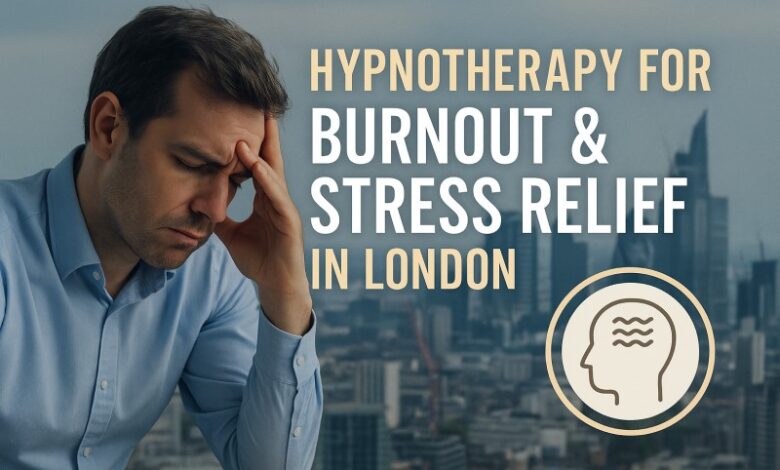How Hypnotherapy Can Help Londoners with Burnout and Chronic Stress
The Rising Tide of Burnout and Chronic Stress in Urban Populations

Burnout and chronic stress have become defining health issues of modern urban life, particularly in densely populated and high-pressure environments like London. Healthcare professionals are witnessing a surge in stress-related presentations, ranging from generalized anxiety and insomnia to gastrointestinal disturbances and cardiovascular symptoms. A 2022 report from the Mental Health Foundation found that over 74% of UK adults felt overwhelmed or unable to cope due to stress within the past year, with city dwellers disproportionately affected.
Burnout—a condition now recognized by the World Health Organization as an occupational phenomenon—is characterized by emotional exhaustion, depersonalization, and reduced personal accomplishment [5]. Chronic stress, when unrelieved, can alter neuroendocrine and immune functioning, increasing the risk of long-term diseases such as hypertension, type 2 diabetes, and depression. In response to these escalating mental health challenges, both patients and practitioners are increasingly exploring integrative treatment approaches. One such modality is hypnotherapy.
Hypnotherapy: A Brief Clinical Overview
Hypnotherapy involves the use of guided relaxation, focused attention, and suggestive techniques to achieve a heightened state of awareness, often called a trance. Unlike the portrayals in popular media, clinical hypnotherapy is a structured and evidence-based intervention often delivered by trained healthcare practitioners.
The therapeutic goal is not to gain control over the patient but rather to enhance their capacity to manage psychological and physiological responses to stress. The British Society of Clinical Hypnosis and the American Psychological Association recognize hypnotherapy as a potentially beneficial adjunct in treating a wide range of conditions, including chronic pain, irritable bowel syndrome (IBS), and psychological distress.
For individuals in high-pressure environments, working with a qualified hypnotherapist in London can provide a tailored and non-pharmacological approach to address the underlying cognitive and emotional patterns contributing to burnout and stress.
Mechanisms of Action: How Hypnotherapy Addresses Stress Pathophysiology
From a neurophysiological perspective, hypnotherapy operates through several mechanisms. Functional imaging studies show that hypnosis can downregulate activity in the anterior cingulate cortex and amygdala—regions involved in processing emotional stress and pain. A 2016 study by Jiang et al. published in Cerebral Cortex demonstrated that hypnotic suggestion can alter functional connectivity in brain regions associated with self-awareness and emotional regulation [3].
In practical terms, this modulation results in reduced cortisol secretion, lowered blood pressure, and decreased sympathetic nervous system arousal—physiological hallmarks of chronic stress. Moreover, hypnotherapy enhances parasympathetic activation, improving sleep quality and gastrointestinal motility, and countering some of the physical sequelae of burnout.
Clinical Evidence Supporting Hypnotherapy for Stress Reduction
While hypnotherapy should not be viewed as a replacement for primary medical or psychiatric care, an expanding body of peer-reviewed research supports its role as an adjunct treatment. A meta-analysis published in The International Journal of Clinical and Experimental Hypnosis found that hypnosis-based interventions significantly reduced stress, anxiety, and depressive symptoms across varied patient groups [1].
In another randomized controlled trial (RCT) by Gruzelier et al., participants who underwent weekly hypnotherapy sessions showed statistically significant improvements in mood and cognitive flexibility compared to controls [2]. These findings are particularly relevant for urban populations, where decision fatigue and emotional reactivity are common under stress.
Hypnotherapy has also been evaluated in workplace settings. A 2020 pilot study in Occupational Medicine found that employees undergoing hypnotherapy reported lower levels of burnout and improved resilience, with sustained effects observed at 6-month follow-up [4].
Personalized Interventions for Burnout
What distinguishes hypnotherapy from generalized relaxation training is its adaptability. Sessions can be personalized to target specific manifestations of burnout—whether emotional numbness, loss of purpose, or chronic fatigue. A session might include visualization techniques to reduce performance-related anxiety or embedded cognitive restructuring to challenge maladaptive beliefs about productivity and self-worth.
Moreover, hypnotherapists often incorporate elements of mindfulness and CBT (cognitive behavioural therapy) into treatment plans, further strengthening coping mechanisms and promoting behavioural change. This integrative approach is particularly useful in complex cases involving overlapping symptoms of anxiety, depression, and somatic complaints.
Accessibility and Considerations for London-Based Patients
One of the challenges in treating burnout is adherence to treatment. Urban professionals may have limited time, fragmented healthcare access, and skepticism toward traditional therapy. Hypnotherapy, particularly when offered in flexible formats (e.g., in-person or telehealth), may bridge this gap by offering time-efficient, targeted interventions that focus on self-regulation.
However, it is crucial for referring practitioners to ensure that the hypnotherapist is registered with a recognized professional body such as the General Hypnotherapy Register (GHR) or the Complementary and Natural Healthcare Council (CNHC). Practitioners should also screen patients for contraindications such as untreated psychosis or dissociative disorders.
Conclusion: A Viable Adjunct in Stress Management
Burnout and chronic stress are complex biopsychosocial conditions that demand multifaceted treatment strategies. Hypnotherapy, when delivered by qualified professionals, offers a promising adjunctive option for patients experiencing chronic stress and burnout in high-pressure urban environments like London.
By targeting the neurophysiological and psychological substrates of stress, hypnotherapy can contribute to symptom relief, functional recovery, and enhanced quality of life. While not a panacea, it is a clinically grounded modality that deserves consideration in any comprehensive stress reduction or burnout recovery plan.


